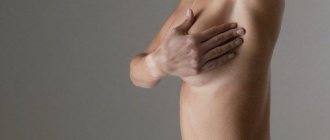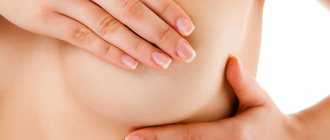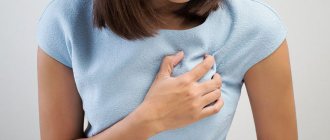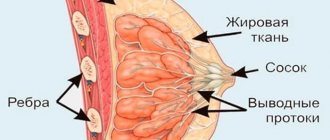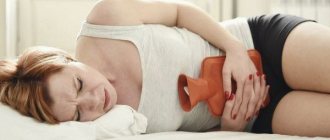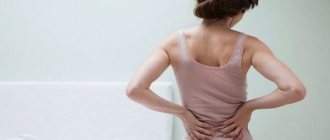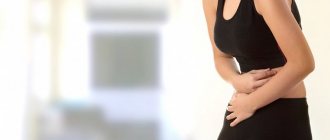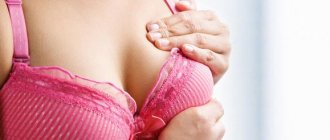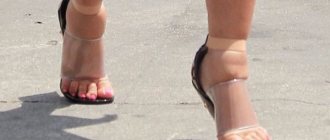Should your chest hurt?
After ovulation, which occurs in the middle of the cycle after menstruation (usually 15 days after the start of KD), progesterone levels begin to increase. Around day 21 of a standard 28-day cycle, hormone production peaks, causing the ducts in the mammary glands to dilate.
Progesterone causes symptoms such as swelling, spasm, heaviness, and hardening of the breast. Thus, due to dilated ducts of the mammary gland and fluid retention in the breasts, it becomes heavy and painful before menstruation.
Menstruation or menstruation
Menstruation is an important physiological process in the female body. Their onset shows that the woman is ready to bear and give birth to children. The name comes from Latin. The medical term “menstruation” is translated as regula or menstruation. This already indicates that they should be regular and monthly.
Puberty in girls begins when they reach the age of 11-13 years (sometimes a later age is allowed). The very first day when spotting appears is considered to be the beginning of the menstrual cycle. The cycle lasts for about a month. Doctors consider periods between 28 and 32 days to be normal.
Every month, women's bodies prepare for conception. The endometrial layer or mucous membrane forms and matures in the uterus. Around the middle of the cycle, an egg is released from the ovary. She is preparing to meet the sperm. If successful fertilization has occurred, the mucous membrane remains in the body and receives the egg, or more precisely, the embryo. Because after the fusion of the egg and sperm, a completely new cell is formed, called an embryo.
If fertilization does not occur, then the body begins to reject the mucous membrane. This is how menstruation begins. In addition to blood, they contain mucus and pieces of the endometrium. Blood is very different from vascular. It is darker and does not have the ability to curl. This is prevented by the enzymes present in it. The duration of bleeding ranges from 3 days to a week. No doctor can tell you the exact number. Everything happens differently for every woman.
Menstruation and the menstrual cycle are the main work of the entire female body. Therefore, it also covers other organs.
The body is preparing for conception, which means it must prepare for future feeding of the baby. Therefore, women often experience mild pain in the mammary glands before menstruation.
Why did the pain disappear?
Why did my breasts stop hurting before my period? Because hormone levels always fluctuate. One cycle may produce more progesterone than another, leading to different types of breast tenderness.
The intensity of unpleasant sensations varies markedly even among the same women at different periods. It is difficult to immediately understand why some suffer greatly from PMS before menstruation, while others feel almost no discomfort.
The full range of symptoms is very wide and is completely normal. You feel how the mammary glands become even denser and noticeably swell and hurt a week before your period. The symptoms that were present this time may not appear later.
Hormonal background
The most common cause of breast pain is the changes in hormones that occur during the menstrual period, particularly the decrease in estrogen levels after ovulation. During ovulation, the levels of the hormones estrogen, progesterone, and testosterone increase. Therefore, premenstrual syndrome worsens when hormone levels drop. And whether your breasts can stop hurting before your period depends directly on these surges.
When hormonal changes in the body are minor, there are no pronounced symptoms.
Your menstrual cycles are significantly affected by therapy if you have taken hormonal medications or pills, especially combined oral contraceptives. Since they prevent ovulation and maintain stable estrogen levels, there are no symptoms of PMS now, and perhaps in the future they will not appear at all or they will become less pronounced.
The intrauterine device also affects the functioning of the mammary glands. It can cause discomfort, or it can help prevent breast pain before menstruation. Everything is very individual, so to be sure, you need to consult your doctor. An active sex life normalizes cycles and often causes the cessation of painful sensations.
Menopause
As women enter perimenopause, estrogen and progesterone levels begin to rise and fall unexpectedly, which can be very concerning at first. Since hormonal surges always cause pain, menopause is accompanied by pain syndrome.
By the way, hormones are released due to stress, which is caused by changes in status, worries associated with aging and change.
And the good news is that if your breasts don’t hurt, this often indicates stability in the body. When the menstrual period does not occur throughout the year, cramps in the mammary glands go away forever or become much less frequent than during reproductive age.
Pregnancy
In pregnant women, hormones are released much more actively than others in order to prepare the organs for a long period of gestation and breastfeeding. The body produces a lot of estrogen and progesterone, even more than in the run-up to menstruation.
- Firstly, glandular tissue can swell to several sizes during gestation and pregnancy. The blood flow becomes much more intense and this often causes severe discomfort. These changes are necessary to get nutrients and fluids from mom to baby! However, it's not just hormones that are to blame.
- Secondly, the fat layer in the mammary glands begins to thicken, which is why the breasts grow so quickly. This is facilitated by changes in eating behavior and increased appetite in pregnant women.
Sometimes these symptoms continue until delivery. But most often, by the second trimester, the breasts stop hurting and growing. Accordingly, there is no reason to worry if the pain returns again towards the end of pregnancy, when colostrum begins to be released.
Such processes always occur with individual hormone surges. Let this not cause any concern to the expectant mother. Each person’s body is subject to its own rhythms and what is normal for one is very different from another.
Other reasons
Let's say you did exercises on your chest muscles, followed by swelling and pain the next day. This type of pain is not actually related to the mammary glands. It is a sign of growth of the pectoral muscles that lie underneath. Fortunately, it is short-term. Depending on how hard you train. And this is treated with the help of sedatives, antispasmodics, massage, warming and cooling gels, as well as by applying heat or ice to the muscles. Gradually you will get used to the loads, and the consequences of overtraining will pass.
Another reason why your breasts don’t hurt before your period is your bra size. If before this the girl did not dare to purchase a larger size of underwear, and her breasts grow over the years, then a poorly chosen bra is to blame for the pain.
It's all about the tight cups, which put a lot of pressure on the chest throughout the day. This leads to inflammation and pain. The same applies to sports bras, although they are considered a gentle type of underwear. But this depends not only on the presence or absence of underwires in the design, but also on the force with which the sports bra hugs the body. In addition, additional movements further stretch the muscle tissue, mammary glands and ligaments due to the increased load.
Our breasts contain small ducts that become swollen due to stimulants such as caffeine and chocolate. Due to edema, the breasts swell, and this causes spasm. As soon as a woman stops consuming foods, such as salt, that bind fluid in the tissues of the body, her breasts immediately stop hurting.
How to respond to breast pain before your period
Often your breasts begin to hurt one to two weeks before your period. Sometimes, in addition to pain, acne appears. The pain itself has basic characteristics. It is cyclical, symmetrical and has varying intensity, sometimes the breasts become a little rougher and swelling appears. In rare cases, the pain radiates to the armpit, shoulder blade or shoulder. Only this always indicates a normal physiological phenomenon. If the sensations intensify and the pain becomes more severe, then most likely these are signs of problems in the female body.
As noted by gynecologists, when the breasts hurt very much before menstruation, then most likely there is an imbalance of hormones in the body and disturbances in the functioning of the ovaries. Very often this is the first symptom of dysfunction. These are also signs of gynecological diseases.
In such a situation, you need to respond to pain especially correctly. It is dangerous if it does not stop after the onset of menstruation. Doctors strongly recommend not to self-medicate. Sometimes it can be even more dangerous than completely ignoring the problem. The pain may be temporarily relieved, but the disease will not go away on its own.
Only an experienced doctor will be able to identify the causes and then find a way to eliminate it.
When to worry
In healthy women, the mammary glands hurt evenly on both sides. The main thing is that nipple sensitivity and swelling remain the same. It is not normal if the chest stops hurting only on one side. Most breast cancers do not cause pain. Even lumpiness, which causes severe anxiety, is normal a week or two before the onset of the critical days.
Breasts cannot be 100% symmetrical, but unilateral chest pain is more likely to indicate a cyst or other benign formation, infection or bruise.
It is also not normal for the pain to persist for a long time after the start of menstruation. As for the lumps, they will go away after a few days of menstruation. If the patient has the habit of doing regular breast examinations at home, then you can make sure that the lumps have passed on your own as soon as your period ends. Consult a doctor only in the following cases: when they do not go away for a long time during menstruation and after their end. You may not even be bothered by anything anymore.
Sometimes the breasts appear “lumpy” due to fibrocystic breast tissue. This is actually a common occurrence and nothing to worry about. Benign cysts are fluid-filled sacs.
Again, they do not increase the risk of breast cancer, but they become larger and more sensitive when a new menstrual period begins due to hormonal changes. If fibrocystic breast tissue is detected, patients are susceptible to caffeine and similar stimulants.
Diagnostics
No matter how much your breasts hurt before your period, doctors strongly recommend consulting with them, especially if it happens all the time. In addition to a gynecologist, you can seek help from a mammologist. If the latter does not detect any compactions, then perhaps no other examinations will be required.
If a woman is over forty years old, a mammologist usually prescribes an ultrasound examination of the mammary glands, as well as an X-ray examination. If suddenly, as a result of the diagnosis, any compactions are discovered, then a biopsy is necessarily prescribed. In this way, a fragment of tissue is studied under a microscope.
What pathologies may appear?
The advice of gynecologists is the same: if your breasts stop hurting, then you should be happy. This means that all pathologies have disappeared and the body has begun to function normally. It is recommended to seek help from a specialist if you experience severe pain that is not normal. Typically, severe pain occurs in the presence of serious diseases, one of which is mastopathy. First you need to visit a gynecologist, and then a mammologist will answer the remaining questions.
One of the reasons for the unpleasant sensation characterized by pain in the groin and mammary glands before the onset of menstruation may be due to mechanical damage. They come from compression, squeezing or strong blows. In this case, clothing, namely a bra or tight trousers, will be the first reason.
The following indicators are considered the main reasons:
- before the onset of menstruation, hormonal changes appear;
- due to fluid retention in the body, pain also appears;
- if the mammary glands are damaged, this is accompanied by a feeling of pain;
- the presence of infectious diseases often entails pain in the breast area;
- A disease such as cancer can also cause an unpleasant sensation in a woman’s chest.
Recommendation: Thanks to an experienced doctor, you can find out about changes in your health, as well as what measures to take. If a hormonal imbalance does not occur, it means that the system has changed to a new level in the body; this phenomenon often occurs in most women.
Could pain relief be a result of lifestyle changes?
The pain can completely disappear after a drastic lifestyle change. This could be a climate change, giving up bad habits, changing diet, etc. This may also result in significant delay.
The following factors most strongly influence the menstrual cycle:
- monotonous diets;
- starvation;
- excessive physical activity;
- constant stress;
- sleep less than 6 hours;
- work in hazardous production;
- abuse of bad habits;
- binge eating.
With a strict diet, your breasts may also stop hurting.
Any fluctuation can provoke a change in the cycle and the disappearance of pain or, conversely, its appearance. The absence of discomfort rarely requires visiting a doctor and treatment.
When should you see a doctor?
If chest pain suddenly disappears in any trimester, doctors recommend paying attention to the size and density of the mammary glands. If there is a reduction in size, it is strongly recommended to undergo an ultrasound.
Painful symptoms are not always considered normal. A sign of pathological processes is when only one breast hurts. Mandatory examination by a specialist is required for heavy purulent or bloody discharge from the nipples.
You should be wary if acute pain is present in a certain place, and hard lumps form. Symptoms may indicate mastopathy or tumor development. Pain under or in the middle of the breast often indicates heart problems. The intensity of pain is considered a sign of lactostasis (milk stagnation) or mastitis.
Ways to reduce pain
If after the examination no pathologies are found, but the breasts still bother you a little before menstruation, then in order for them to stop hurting, you need to do the following:
- Try to create a calm environment;
- Free yourself from unnecessary stress;
- Find ways to completely relax;
- Do something nice for yourself.
You can refuse to wear a bra these days, because it slightly compresses the blood vessels and lymph nodes, which greatly interferes with blood circulation in the chest.
If the pain is acute, then you don’t have to endure it and you can take standard painkillers. But they should not be abused, only as a last resort. And we must remember that you should not take any medications if your plans include pregnancy.
There are other options to get rid of pain in the mammary glands:
- Oral contraceptives. These are conventional contraceptives, they are good in this case because they contain synthetic versions of female hormones. Just remember that you shouldn’t take them just because of chest pain;
- An effective remedy for pain is various magnesium supplements;
- Severe chest pain before menstruation can be relieved with herbal remedies. These are herbal infusions from herbs such as: St. John's wort, nettle, cinquefoil, string, peony;
- You should completely avoid caffeine, that is, avoid drinking coffee, strong tea, and some energy drinks.
In addition, there are many plants that have an excellent effect on hormonal processes. These include: red clover, soybeans, raspberry leaves, flaxseeds, sage. They contain phytoestrogens. The substances are of plant origin, their effect is mild and resembles the work of estrogen (that is, the female sex hormone).
But if after the examination pathologies are discovered, then the doctor prescribes full treatment.
What other reasons are there?
The pain may disappear with prolonged use of vitamin complexes. The condition should not cause concern, since vitamins have a positive effect on the body and help normalize hormonal levels.
Often premenstrual syndrome disappears in women after the first birth. The uterus is in the correct position. In this case, the unpleasant symptoms before menstruation will no longer bother you.
Treatment
When the causes of pain in the mammary glands are identified, the doctor selects the optimal type of therapy. Since the causes can be very diverse, different treatment methods are possible. Some options:
- Wearing a comfortable and supportive bra;
- Taking a drug such as danazol;
- Reducing daily salt intake;
- Taking vitamins E or B6;
- Taking hormonal or non-hormonal drugs, combination treatment is possible and much more.
If the causes are chronic diseases or diseases of the genital organs, then anti-inflammatory drugs or antibiotics are prescribed. In some cases, physiotherapy is possible, but only as prescribed by doctors. Gynecologists strongly recommend that under no circumstances do warming procedures be performed. Often this way can only complicate the disease. Any treatment must be carried out under medical supervision. Self-medication can only do harm.
We must remember that if the breasts stop completely hurting before menstruation, then this is an indicator not only that everything is fine in the body, but it is possible that pregnancy has occurred and the body is preparing for lactation.
The female body is complex and it is not always possible to immediately figure out where there are problems and where the norm is. To avoid doubts and worries, you should be examined by a gynecologist for preventive purposes at least once every six months.
When there is no pain due to hormonal changes
The main reason for the lack of hypersensitivity of the glands is changes in hormonal levels. Usually the pain disappears when a woman begins to monitor her health and directs her energy to restore her cycle. In this case, not only breast swelling, but also other symptoms disappear. The woman feels more than satisfactory. Performance does not decrease.
Starting hormonal therapy can lead to changes. Such drugs should be taken strictly in consultation with the doctor. Otherwise, you can harm yourself and provoke a number of violations.
Causes of pain
Most often, the mammary glands begin to swell in the second phase of the menstrual cycle, after ovulation. Such symptoms indicate that the body is preparing for conception.
At this time, progesterone accumulates, its level rises significantly, which is why the mammary glands begin to ache. When fertilization does not occur, critical days begin, the body stops all work to prepare for bearing a child, so the breasts stop hurting during menstruation, and its shape and size returns to its normal state.
In this case, chest pain is caused by physiological processes and is considered normal, but if the mammary glands do not hurt before menstruation, you should consult a doctor to find out the root cause.
